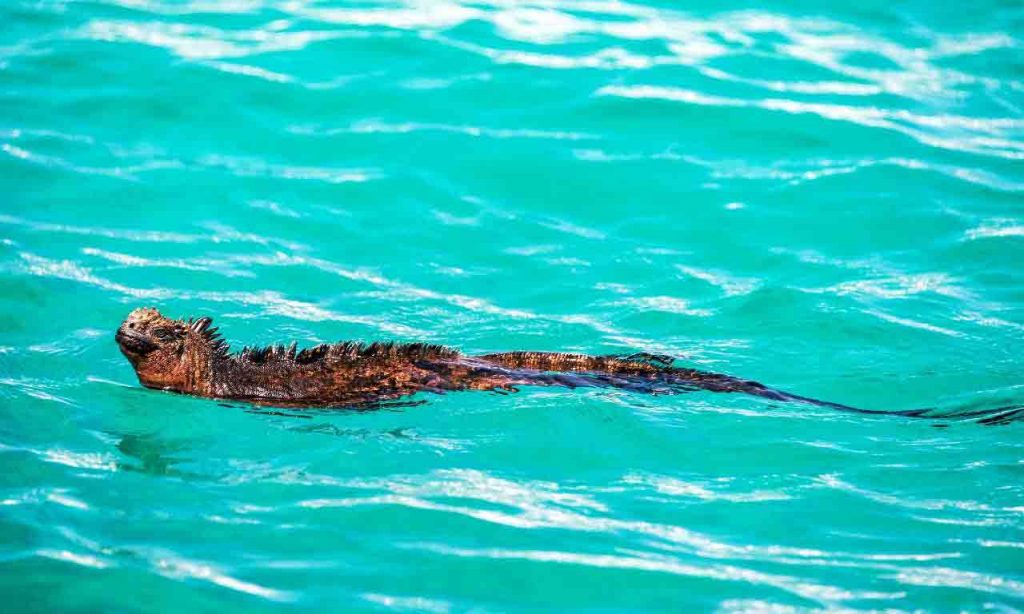
 Lizards are usually seen on land. You’ll barely notice a lizard swimming. Additionally staying in water can be risky for small lizards as many predators live in the water, along with that their body is more functional on land.
Lizards are usually seen on land. You’ll barely notice a lizard swimming. Additionally staying in water can be risky for small lizards as many predators live in the water, along with that their body is more functional on land.
But can lizards survive in water? Lizards are good swimmers, and they can survive in water. Lizards keep their nose out of the water while swimming so they can breathe, and that’s why they won’t run out of breath, and they can also hold their breath for some time. But there is a threshold if they cross that then they can die.
What Happens If A Lizard Falls Into Water?
A lizard can die if they fall in a tub that is filled with water. You can see house lizard falling into the tub and struggling to get out. There are a few reasons why a lizard will die if it falls in the tub. The surface of the tub is slippery in general, so it’s difficult for the lizards to capture the tub surface along with that there are water droplets over them, making it even more slippery.
So if the tub is filled with water, the lizard will not be able to come out and will die after that. But if the tub is not filled with water, then the lizard will not die immediately. However, the lizard can still die if it is trapped over there for days. Unable to get food, thus killing the lizard.
House lizards are more vulnerable to these kinds of incidents as they live with us. When a lizard falls in the water and is unable to come out their body temperature drops very fast along with that the lizard will get tired of swimming, they won’t be able to consume any food, and they will die. Unless someone helps them to come out, it can be challenging for the lizard to come out of the tub by itself.
If a lizard falls in a pond or any water body, then the lizard may be able to come out if there is no slippery surface. The slippery surface can make it difficult to grab the surface as a result, and the lizard will not be able to come out. This thing happens with big lizard-like monitor lizard as they have a heavy body.
A lizard cannot come out if the water current is strong. If the water current is strong, then the lizard will flow with the current and can land on any rock or can get drowned.
Usually, a small lizard won’t get drowned easily, but big lizard can drown because of their heavy body. If there is no water current or the current is mild, then it will be a lot easier for the lizard to come out of it. Lizards are after all good swimmers.
Can Lizard Live Underwater?
Lizards don’t have gills so they cannot breathe underwater, which means they can hold their breath for a while, but they eventually have to come out of water for air. Their body is not designed to live in water. They can hold the breath and can stay underwater for a while.
Marine iguanas can survive underwater for a longer time compared to other lizards. They are big and can hold their breath for more than 10 minutes. After that time frame, they have to come up and consume air or else they will also die. They are marine iguanas, so there body is designed for swimming in the water.
Lizard Running On Water
 There is a lizard that can run on water, also known as Jesus lizard. They can run over the water and can cross from one part of the land to another just by running over water, but if they fall in the water while running, they won’t be able to run over the water again. They need to build the momentum on the land and then they can run on the water. If they fall in the water, they will swim and cross the water.
There is a lizard that can run on water, also known as Jesus lizard. They can run over the water and can cross from one part of the land to another just by running over water, but if they fall in the water while running, they won’t be able to run over the water again. They need to build the momentum on the land and then they can run on the water. If they fall in the water, they will swim and cross the water.
Lizards And Water
If the water is too cold, then the lizard will not be able to survive for too long and if the water is too hot then obviously the lizard will die almost instantly. If the water is hot, it will inevitably kill almost all living creatures that fall in it.
Many predators live in the water and lizards are aware of them, so that’s they prefer to stay out of the water. That said there is some environment where living on land poses much more danger, so lizards prefer water in those scenarios.
Lizards can swim through the water in search of a mate. This is quite common which dictates that lizards can swim. However, it comes with significant risks as there can be many predators hiding in the water.
Some lizards are faster on the water than on land; for example, Chinese water dragon they can swim much faster once they are in the water, they can track their prey and hunt. Not all lizard have this ability. Their tails help then in controlling the direction and move forward in the water. Their big tail plays a vital role in swimming.
The tail helps them to move forward. A lizard swings its tail left and right, which helps them to swim in the water. Lizards keep their nose out of the water while swimming. This is an effective technique since their body can get continuous oxygen supply which can prevent fatigues. Most four-legged animals follow this technique.
Lizard’s History With Water
Lizards were a marine species millions of years ago. They started to evolve and then came on the land. Well, they were not exactly lizard back then, but it was ancestors of modern lizards. On the land, they got bigger and developed structures that will allow them to live on land. After the ancestor came on land, they developed into various species.
They kept evolving on the land. That said lizards didn’t completely lose the ability to swim in the water, so if they fall in the water, somehow they could swim back. This ability is also present in today’s lizard thanks to their evolution.
What To Do If You See A Lizard In Water?
You won’t see that often, but it can happen. What you are going to do depends upon what kind of lizard is there. If it is a home gecko, then you can capture it and keep it away from the water. If it’s a garden lizard, then it’s better not to use a hand. Instead, use a tool to hold them and keep them away from water.
Now, if it’s a big lizard, then you need to take extreme precaution. Big lizards are very aggressive and can attack a human even if you are trying to help. Their bite can be fatal, so it’s better to take a team and use proper equipment to capture the lizard.
Scenario Simulation
 Home Gecko: If a home gecko falls inside a tub, then it can die. Most of the time, we only see home geckos because they are the one who lives with us.
Home Gecko: If a home gecko falls inside a tub, then it can die. Most of the time, we only see home geckos because they are the one who lives with us.
Monitor: If a monitor lizard falls on a pond, then it will try to climb out of the water immediately unless there is a reason to stay on the water. But if the surface is slippery, then it can become difficult for the monitor lizard to climb out because their body is heavy, and they have a massive tail which is also heavy.
Garden Lizard: Garden lizard often encounters water bodies because if water gets stores in your area due to rainy season, then they will encounter it. They will swim and cross that if they don’t see any alternatives. They have a light body so they can climb out even if the surface is slippery.
Conclusion
Lizards primarily live on land, and they don’t go near the water until there is an absolute need like searching for a mate or tracking a prey. If they accidentally fall in the water, they will try to come out of that place immediately. Marine iguanas are good swimmers, and they spend most of the time in the water. They don’t have gills, but they can hold their breath for a long time.
Welcome to my blog. I have been doing pest control for years since my house, garden and pets were always attacked by various kinds of pests and as a result I had to know proper pest control techniques that works. In this blog I share all the tips and tricks that I know and I hope you’ll find it helpful.
